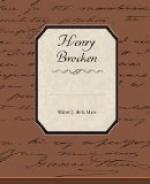I bowed and murmured an apology for my intrusion, just as I might perhaps to some apparition of nightmare that over-stayed its welcome.
“I beseech you, sir,” he replied, “say no more! It may be I deemed you at first a visitor perchance even more welcome—if it be possible,... yet I know not that either. My name is Ennui,”—he smiled again—“Prince Ennui. You have, perchance, heard somewhere our sad story. This is the perpetual silence wherein lies that once-happy princess, my dear sister, Sleeping Beauty.”
His voice seemed but an echo amongst the walls and arches of this old house, and he spoke with a suave enunciation as if in an unfamiliar tongue.
I replied that I had read the ever-lovely story of Sleeping Beauty, indeed knew it by heart, and assured him modestly that I had not the least doubt of a happy ending—“that is, if the author be the least authority.”
He narrowed his lids. “It is a tradition,” he replied; “meanwhile, the thickets broaden.”
Whereupon I begged him to explain how it chanced that among that festive and animated company I had read of, he alone had resisted the wicked godmother’s spell.
He smiled distantly, and bowed me into the garden.
“That is a simple thing,” he said.
Yet for the life of me I could not but doubt all he told me. He who could pass spring on to spring, summer on to summer, in the company of beasts so sly and silent, so alert and fleet as these hounds of his, could not be quite the amiable prince he feigned to be. I began to wish myself in homelier places.
It seems that on the morning of the fatal spindle, he had gone coursing, with this Safte and Sallow and his horse named “Twilight,” and after wearying and heating himself at the sport, a little after noon, leaving his attendants, had set out to return to the palace alone. But allured by the cool seclusion of a “lattice-arbour” in his path, he had gone in, and then and there, “Twilight” beneath the willows, his hounds at his feet, had fallen asleep.
Undisturbed, dreamless, “the unseemly hours sped light of foot.” He awoke again, between sunset and dark; the owl astir; “the silver gnats yet netting the shadows,” and so returned to the palace.
But the spell had fallen—king and courtier, queen and lady and page and scullion, hawk and hound, slept a sleep past waking—“while I, roamed and roam yet in a solitary watch beyond all sleeping. Wherefore, sir, I only of the most hospitable house in these lands am awake to bid you welcome. But as for that, a few dwindling and harsh fruits in my orchards, and the cold river water that my dogs lap with me, are all that is left to offer you. For I who never sleep am never hungry, and they who never wake—I presume—never thirst. Would, sir, it were otherwise! After such long silence, then, conceive how strangely falls your voice on ears that have heard only wings fluttering, dismal water-songs, and the yelp and quarrel and night-voice of unseen hosts in the forests.”




